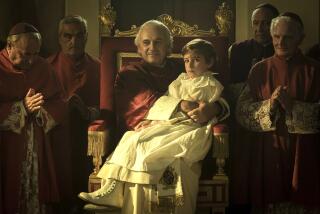Divertimento 1889<i> by Guido Morselli; translated by Hugh Shankland (Dutton: $15.95; 145 pp.) </i>
- Share via
Only if you respect pain can you be truly lighthearted. If pain is a natural dimension of life, it does not necessarily corrupt the other dimensions. It is a contentious neighbor, not a usurper.
Several contemporary Italian writers seem to possess a unique faculty for holding a philosophical balance between pain and life, between light and dark: Italo Calvino, Primo Levi, Francesca Durranti. It is not a sentimental or yielding balance; it is a prickly one. Death mocks at life, life mocks at death. Each holds its own perpetually assailed and perpetually inviolate place in a round dance that goes back to the circles of commedia dell’arte.
Guido Morselli’s “Divertimento 1889,” a seemingly blithe story about a fictional escapade by Italy’s King Umberto I, manages to froth engagingly while something we cannot see is lifting the small hairs on the back of our neck. The neighbor never appears, but we hear him muttering across the hall.
Morselli shot himself to death in 1972 after writing seven unpublished novels. Today, thoroughly published, he is considered one of Italy’s most important contemporary writers. Another balance of light and dark.
Umberto, the model for his fictional protagonist, was a reasonably decent king and a reasonably dull one. Nonetheless, he was assassinated in 1900. At the time, being shot or blown up by anarchists was virtually part of a conscientious sovereign’s job, like getting his papers out on time, or dealing with relatives who didn’t realize that what they were related to was no longer either absolutely powerful or absolutely rich.
“Divertimento” is a version of the classic tale of the king on vacation in disguise. It is the belle epoque’s Chocolate Soldier kind of fable; a bittersweet fling by a desk-bound and much plagued monarch. It is a blend of comedy and farce, even if the bitter does occasionally seem oddly emphatic.
The reader may register a premonition, but he will not be able to prove that the writer is slipping him one. Morselli is an artist and, as such, would never dream of playing fair. (We will not know how great an artist until more of his work is translated. With luck, it will be in translations as supple and natural as this one by Hugh Shankland.)
The king--Morselli simply calls him the King and later, when he is on his outing, the Count--reminds us of Otto Soglow’s cartoon, The Little King. He is formidably hedged in; his only relief is in mental reservation and occasional irrationality.
The hedging-in is shown with comic economy. The King’s entourage gives him paper work instead of assistance. His summer retreat is simply a branch office. His wife and official mistress, virtually interchangeable, are elegant, expensive and no fun at all.
The Queen, Morselli writes, possessed a gracious smile “which has brought comfort to cholera and earthquake victims, and which first and foremost comforts herself.”
What transforms the King, a short-sighted and mediocre man, is his yearning to escape. And one day, a new aide appears in his retinue; a magic-maker, a man who makes his master feel, for the first time, well-served.
If the services seem to profit this paragon--his name is Vigliotti--even more than they do the King, that is another matter. In any event, the King needs money and Vigliotti just happens to know a rich German woman who lives in Switzerland and wants to buy one of the less-used royal estates.
Accompanied by Vigliotti, and by two wonderfully foolish assistants--his doctor and his private
secretary--the King disguises his identity and sets off to see Frau Goltz. She is attractive, there is a brief affair that displays her sexual adeptness, and she buys the royal land for twice what the King had hoped to get.
What could be better? The King window-shops in the little Swiss town; he flirts with the baker’s wife; he plays solitaire in the hotel lobby; he goes down to the station to admire a locomotive and its engineer. As a “private citizen,” he is able to take pleasure in this splendid engine of a progress which, as King, he is duty-bound to disapprove of. “Kings, if they are consistent, must abhor (progress) as the beginning of their end,” Morselli writes.
And finally, he is able to dally with the astonishingly eager Clara, the fiancee whom Vigliotti has maneuvered into accompanying the tour. True, nothing quite comes of it apart from a series of languorous near-misses. “Man proposes, God indisposes,” Clara sighs when, after a carefully arranged rendezvous in her bedroom, she confesses that she is having her period. And still, the King feels alive, he feels happy; so much so, that he has to inscribe in his pocket agenda: “Remember to go home.”
But the reader will not miss the fact that Frau Goltz, apart from her satisfying transactions with the King, is also close to the German Emperor and to the Krupps. And that both of these powers are anxious that Italy should make no objection to the exploitation of the Congo by the Belgians and Germans. And that Vigliotti is also Frau Goltz’s lover. And that Clara’s amorous twittering seems to conceal a purpose that is not even hinted at. The 20th Century is muttering across the hall.
Never does the ingenious author go beyond the conventions of belle epoque romantic comedy. Colored parasols, luxury, solid assurance and dyspeptic pleasure. In an afterword, he insists that he has nothing but lightness in mind. His story “means to imply no more than it says.”
Then he adds, ambiguously: “Plausible yet tenuous, it confines itself to its flower-stands and mantelpieces, its coaches and steam-engines--a world of vanished things which seem almost incredible now, and which nonetheless have been for me, an essential theme, anything but decoration.” Finally, he writes: “I do not hold that a book need necessarily be escapist, even if its subject is escape.”
The frivolities of “Divertimento” amuse us, but for a while they puzzle us as well. Then, they gradually turn our hearts to stone.
More to Read
Sign up for our Book Club newsletter
Get the latest news, events and more from the Los Angeles Times Book Club, and help us get L.A. reading and talking.
You may occasionally receive promotional content from the Los Angeles Times.










